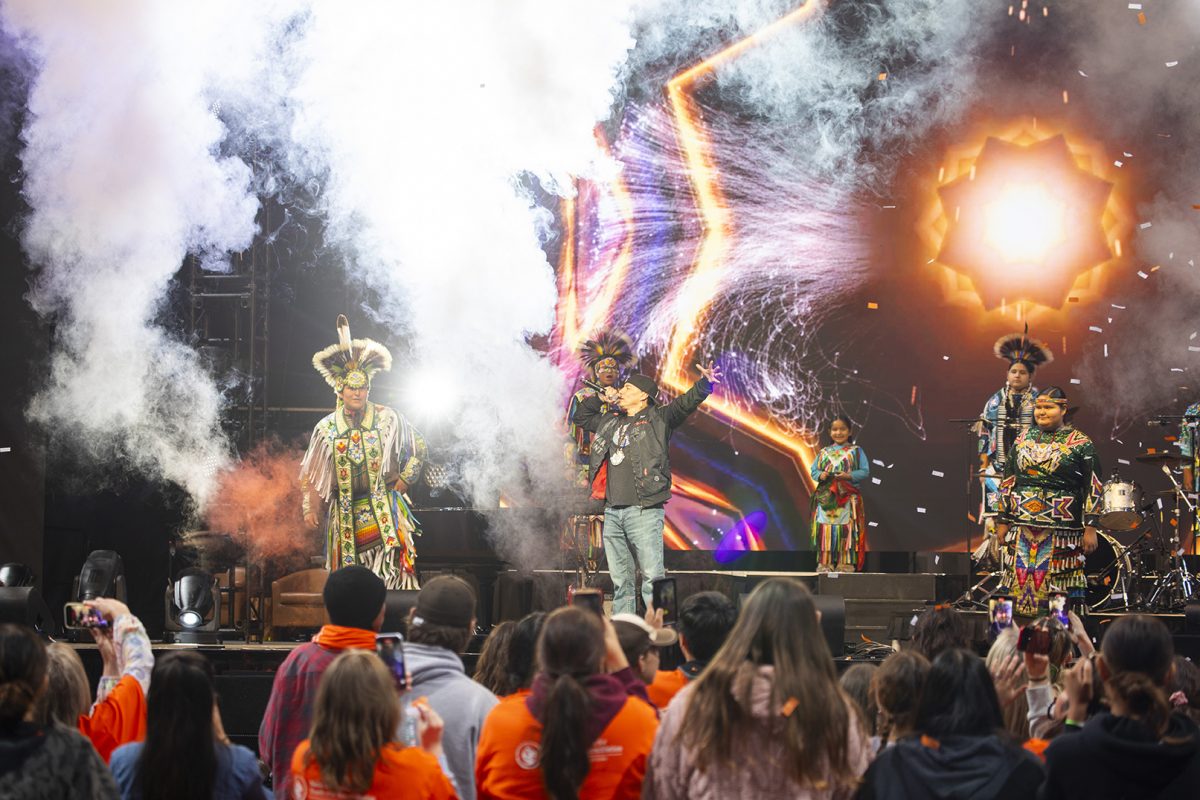
Mino-pimatisiwin 2024
The Youth Empowerment Gathering highlighted the strength of Indigenous communities and their ongoing efforts to restore the ‘good life’ for future generations
Mino-pimatisiwin – The Good Life, a Youth Empowerment Gathering by the National Centre for Truth and Reconciliation (NCTR), was an uplifting 90-minute event celebrating Indigenous culture and the importance of living in harmony with one’s heritage and identity. Hosted by Michael Redhead Champagne and Janelle Wookey, the gathering featured performances from Indigenous musicians and dancers while honouring the lived experience and contributions of Residential School Survivors.
The event, held on September 18 at the Canada Life Centre in Winnipeg, centered around the theme of “Mino-pimatisiwin,” which means “the good life” in Cree and refers to living in accordance with one’s true nature and the laws of the natural world. There were over 6,000 students from schools across the city in attendance proudly wearing orange shirts.
The gathering opened with a prayer from Elder Florence Paynter, who reminded the audience of the importance of acknowledging life, the Creator, and Mother Earth. “Through knowing who we are as a people, knowing our own identities, it can bring us closer to one another and appreciate each other’s lives.” This opening set the tone for an event steeped in the richness of tradition, history, and culture.
As part of the opening remarks, Nastania Mullin, CEO of the Manitoba Inuit Association, addressed the significance of involving both Elders and youth in cultural preservation. “Coming today is a testament to where we’re going. And it’s you, the youth, that we need to look at. The beautiful thing about a good life is that it’s continuously ongoing.”
Survivors Levinia Brown, Dorene Bernard, and Laurie MacDonald shared stories of survival, cultural reclamation, and the importance of intergenerational learning.
Levinia Brown reflected on her community’s strength. “The good life that we’re celebrating today, we had it. We had it because of our ancestors who were determined to survive. And they bring us to this day and age where we can share each other’s knowledge and our experiences and learn from each other.”
Dorene Bernard shared how spirituality and reconnection with the Creator helped many Survivors on their healing journey and how they’re teaching that to the next generation “It took us a long time to find our voice, and we don’t want that for you. We want you to get whatever you need to live a good life. You leave behind all those things that hold back your spirit from growing. Physical, mental, emotional, and spiritual health are found in the ways that we learn to love ourselves so that we can love another and in how we respect ourselves so that we can respect others.”
Stephanie Scott, Executive Director of the National Centre for Truth and Reconciliation, reflected on the strength of Indigenous people in maintaining their traditions and languages, despite attempts by residential schools to erase them.
“We are so grateful for the strength and courage of the Survivors, Elders, and Knowledge Keepers who have kept our tradition and languages alive despite all the terrible hardships they have endured,” she said. “And we are also very grateful for the young people who are engaging with the culture of the nations with such pride and enthusiasm, who are learning the old stories, our songs and dances, our crafts, and our survival skills. We surround them with love and culture, and we ensure our young people have the support and the knowledge they need to play their parts in restoring the good life.”
The Honourable Wab Kinew, Premier of Manitoba, shared his personal connection to the gathering. He outlined how his father was taken to a residential school as a child and how as a young man he was not allowed to vote.
“Residential School Survivors went through so much and overcame so much to give somebody like me a chance to do what I love to do,” he said in speaking to the youth in attendance. “You have the freedom to identify yourself in a way that is true to who you are. You have the freedom to go out and make the most of your lives. And know that when you succeed, you fill the hearts of all those who have come before you.” The crowd of students was electrified by the Premier’s words, cheering and whooping multiple times during his speech.
Throughout the event, the audience went through a journey of honest and deep reflection intermingled with elation. Music and entertainment were key elements of the gathering, and the students excitedly engaged with each performer, including DJ Kaptain, Walking Wolf Singers and 10 Powwow Dancers, Rebecca Strong, Mimi O’Bonsawin, Dakota Bear, Joleen Mitton, Najib Wasajja, Morgan Grace accompanied by Mitchell Makoons, Ivan Flett Memorial Dancers, Ry Moran and Alicia Kaylay, Stella Standingbear, Mattmac, Aleatra Sammurtook and Caramello Swan, Peter Alareak and Luke Amittu, Katarina Ziervogel, JRDN and Karsen Grey, Venus, and Supaman.
Through speeches, music, and cultural expression, Mino-pimatisiwin stood as a testament to the power of storytelling, the survival of Indigenous knowledge, and the commitment to living “the good life” in harmony with nature and each other.
This event is just one of the many educational events and programs offered through the NCTR, as a part of their mandate is to raise awareness of the history and creation of the residential school system, its ongoing legacy, and how it has shaped the country we live in today. The teaching resources and educational programming they offer make it easier for the public to learn the truth about this tragic history.
The NCTR works closely with educators from a variety of sectors including the K-12 school system, post-secondary institutions, public service and professional sectors to provide access to materials and resources that can aid Canadians of any age to learn about and participate in reconciliation. Please visit the NCTR website for more information.






